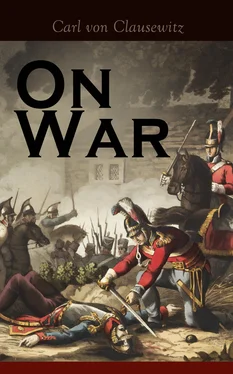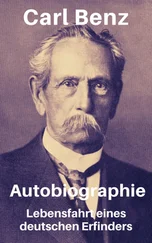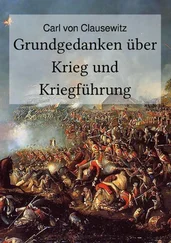Secondly, although the opposition offered by the enemy has a direct effect on the Commander through the loss of means arising from prolonged resistance, and the responsibility connected with that loss, and his force of will is first tested and called forth by these anxious considerations, still we maintain that this is not the heaviest burden by far which he has to bear, because he has only himself to settle with. All the other effects of the enemy’s resistance act directly upon the combatants under his command, and through them react upon him.
As long as his men full of good courage fight with zeal and spirit, it is seldom necessary for the Chief to show great energy of purpose in the pursuit of his object. But as soon as difficulties arise—and that must always happen when great results are at stake—then things no longer move on of themselves like a well-oiled machine, the machine itself then begins to offer resistance, and to overcome this the Commander must have a great force of will. By this resistance we must not exactly suppose disobedience and murmurs, although these are frequent enough with particular individuals; it is the whole feeling of the dissolution of all physical and moral power, it is the heartrending sight of the bloody sacrifice which the Commander has to contend with in himself, and then in all others who directly or indirectly transfer to him their impressions, feelings, anxieties, and desires. As the forces in one individual after another become prostrated, and can no longer be excited and supported by an effort of his own will, the whole inertia of the mass gradually rests its weight on the Will of the Commander: by the spark in his breast, by the light of his spirit, the spark of purpose, the light of hope, must be kindled afresh in others: in so far only as he is equal to this, he stands above the masses and continues to be their master; whenever that influence ceases, and his own spirit is no longer strong enough to revive the spirit of all others, the masses drawing him down with them sink into the lower region of animal nature, which shrinks from danger and knows not shame. These are the weights which the courage and intelligent faculties of the military Commander have to overcome if he is to make his name illustrious. They increase with the masses, and therefore, if the forces in question are to continue equal to the burden, they must rise in proportion to the height of the station.
Energy in action expresses the strength of the motive through which the action is excited, let the motive have its origin in a conviction of the understanding, or in an impulse. But the latter can hardly ever be wanting where great force is to show itself.
Of all the noble feelings which fill the human heart in the exciting tumult of battle, none, we must admit, are so powerful and constant as the soul’s thirst for honour and renown, which the German language treats so unfairly and tends to depreciate by the unworthy associations in the words Ehrgeiz (greed of honour) and Ruhmsucht (hankering after glory). No doubt it is just in War that the abuse of these proud aspirations of the soul must bring upon the human race the most shocking outrages, but by their origin they are certainly to be counted amongst the noblest feelings which belong to human nature, and in War they are the vivifying principle which gives the enormous body a spirit. Although other feelings may be more general in their influence, and many of them—such as love of country, fanaticism, revenge, enthusiasm of every kind—may seem to stand higher, the thirst for honour and renown still remains indispensable. Those other feelings may rouse the great masses in general, and excite them more powerfully, but they do not give the Leader a desire to will more than others, which is an essential requisite in his position if he is to make himself distinguished in it. They do not, like a thirst for honour, make the military act specially the property of the Leader, which he strives to turn to the best account; where he ploughs with toil, sows with care, that he may reap plentifully. It is through these aspirations we have been speaking of in Commanders, from the highest to the lowest, this sort of energy, this spirit of emulation, these incentives, that the action of armies is chiefly animated and made successful. And now as to that which specially concerns the head of all, we ask, Has there ever been a great Commander destitute of the love of honour, or is such a character even conceivable?
Firmness denotes the resistance of the will in relation to the force of a single blow, staunchness in relation to a continuance of blows. Close as is the analogy between the two, and often as the one is used in place of the other, still there is a notable difference between them which cannot be mistaken, inasmuch as firmness against a single powerful impression may have its root in the mere strength of a feeling, but staunchness must be supported rather by the understanding, for the greater the duration of an action the more systematic deliberation is connected with it, and from this staunchness partly derives its power.
If we now turn to strength of mind or soul , then the first question is, What are we to understand thereby?
Plainly it is not vehement expressions of feeling, nor easily excited passions, for that would be contrary to all the usage of language, but the power of listening to reason in the midst of the most intense excitement, in the storm of the most violent passions. Should this power depend on strength of understanding alone? We doubt it. The fact that there are men of the greatest intellect who cannot command themselves certainly proves nothing to the contrary, for we might say that it perhaps requires an understanding of a powerful rather than of a comprehensive nature; but we believe we shall be nearer the truth if we assume that the power of submitting oneself to the control of the understanding, even in moments of the most violent excitement of the feelings, that power which we call self-command , has its root in the heart itself. It is, in point of fact, another feeling, which in strong minds balances the excited passions without destroying them; and it is only through this equilibrium that the mastery of the understanding is secured. This counterpoise is nothing but a sense of the dignity of man, that noblest pride, that deeply-seated desire of the soul always to act as a being endued with understanding and reason. We may therefore say that a strong mind is one which does not lose its balance even under the most violent excitement.
If we cast a glance at the variety to be observed in the human character in respect to feeling, we find, first, some people who have very little excitability, who are called phlegmatic or indolent.
Secondly, some very excitable, but whose feelings still never overstep certain limits, and who are therefore known as men full of feeling, but sober-minded.
Thirdly, those who are very easily roused, whose feelings blaze up quickly and violently like gunpowder, but do not last.
Fourthly, and lastly, those who cannot be moved by slight causes, and who generally are not to be roused suddenly, but only gradually; but whose feelings become very powerful and are much more lasting. These are men with strong passions, lying deep and latent.
This difference of character lies probably close on the confines of the physical powers which move the human organism, and belongs to that amphibious organisation which we call the nervous system, which appears to be partly material, partly spiritual. With our weak philosophy, we shall not proceed further in this mysterious field. But it is important for us to spend a moment over the effects which these different natures have on, action in War, and to see how far a great strength of mind is to be expected from them.
Читать дальше












